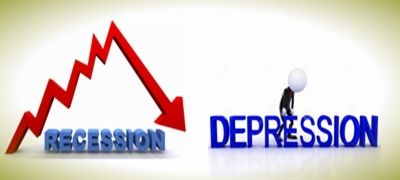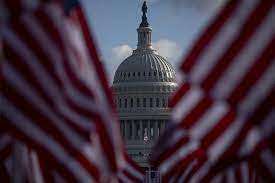“Today’s crises are tomorrow’s stories, and it’s your story. Decide what acts you wish to portray.” –Dr Prem Jagyasi
Recessions and Depressions are very much the same in their essence: loss of activity, production and growth within an economy. However, there are some distinct differences between the two phenomena. The duration and severity of the event is usually what distinguishes whether a recession has become a depression; depressions are simply longer and widespread recessions. Recessions are part of more regular economic cycles as markets correct and adjust to growth and productivity shifts. Depressions are the more aggressive version, basically.
The “Greats”
Perhaps the two best, or… greatest examples to give would be the two “greats”. The Great Depression and The Great Recession. Both brought pain and discomfort to a multitude of people. Job loss. Work shortages. Production decline. An overall loss in economic activity.
A variety of causes and effects are observable in either situation. Inflation played Oversaturated and overvalued markets saw their bubbles pop; both predominantly in the stock market and real estate. In 1929 more so the stock market, in 2007 it was more the real estate market. Inflation accompanied the crashes and played a role in the loss of buying power. Many were left without a job and therefore money to sustain their lifestyles. Homes were lost and repossession rates flew high in both events.

But, How Do They Differ?
Recessions come and go, but depressions stay for a while. For perspective: we’ve had 12 recessions since the great depression, the recession of ‘08 being the most severe. No depression since.
Think of a national economy kinda like a Cryptocurrency, in graph form: up in general but down drastically at times when value is being corrected from an overvalued state. Recessions aren’t exactly good, but natural to growth and changes in society. They bring our eyes to focus on ways to further sustain our economy- to prevent depressions
Depressions are more like those periods of elongated dip where the graph dips to a plateau for some time. They’re not your average correction- there are a multitude of factors that are at play other than inflation and oversaturation/overvaluation.
GDP and Unemployment rates move in the opposite of an ideal direction. When depressions hit, Unemployment rises upwards of 20%. The GDP sees a steady fall of 10%. As compared to a recession where you may see double digit losses in GDP for a short time, and double digit unemployment for short periods of time, and not as high as 20%.
Though observed regionally and consistently throughout economic history, drought famine and pestilence can bring heavy burdens when major agricultural production is affected. During the depression, these things caused multitudes to come to cities in search of a liveable environment, being one of the reasons our economy took a long time to recover. It wasn’t something to exactly plan on or prevent.
With a crashed stock market and real estate arena, low GDP and high unemployment, natural challenges only pressed more weight down on a crippled economy. There were no safety nets. Unprecedented growth turned into unprecedented loss- only to be topped off with an unprecedented natural strain on production. This recession couldn’t recover fast enough. Changes needed to be made.
Safety First
Many of the “safety nets” that have kept recessions from getting out of hand were set in place because of the depression and recessions since then. Government policies, as well as the production boom brought on by World War II are credited with bringing us out of the depressive state. Though the States continually print ungodly amounts of money and acquire exponential debt, we’ve seem to have found ways to keep ourselves out of the mire. Not exactly the most ideal solutions; bailouts, social programs and well kept levels of inflation have given their helping hand. However, I would say the biggest safety net for any economy is the innovative and ever growing side of technological advancement. When new things continue to come, when things continue to change, then things will continue to grow.
Evolving With Society…
Recessions and Depression share pretty much every characteristic except for severity and longevity. Recessions come as societies go through shifts, and depressions come when those shifts become too intense to handle when certain economic factors are overlooked. When things like pestilence, famine and drought come by the way, they add pressure and strain to the situation. When market booms are combined with overbought or oversold assets, as well as unaccounted for loss in production, the outcome usually isn’t looking good.
In our day and age, however, it seems we’ve come to a point where recession and correction are a constant battle. Though faced with problems like inflation and oversaturated markets, things are exponentially growing and changing, especially in the age of information and technological paradigm shifts. There is always a need for new types of labor and service. The market continues to expand.

Possibilities:
Does this mean that we can’t possibly get back into a depressed state? Well no, actually. There is still a chance for such things to occur. We’ve just gone through a worldwide pandemic. Businesses were shut down either temporarily or indefinitely. Families lost their sources of income. Governments paid out trillions in bailouts, economic stimulus and unemployment. Labor is a rare commodity in multiple fields of work. Inflation is at an alarming rate in the U.S. and natural disasters continue to hinder production and commerce.
The level of uncertainty the world economy has right now is high, but the future is certain: change will come. We may simply be transitioning into more modern and effective systems. Or we may be waiting to see the system suffocate and crumble in the wake of a hurting global economy. Some say the Covid recession only lasted a couple months, others would say that we never got out of the recession from ‘08. Either way, it’s thought provoking to evaluate the state of our collective economy, now and then.




